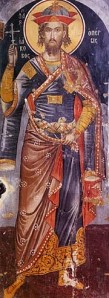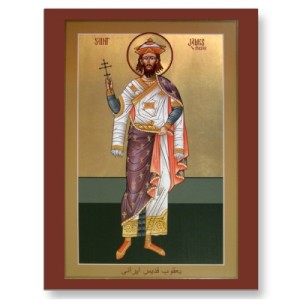Ένας ισχυρός βασιλιάς άκουσε για έναν άγιο ιερέα, πως έχει θεραπευτικές ικανότητες. Τον κάλεσε, λοιπόν, μήπως τον βοηθήσει να αντιμετωπίσει τους δυνατούς πόνους στην σπονδυλική του στήλη.
-Ο Θεός θα μας βοηθήσει, είπε ο άγιος άνθρωπος, όταν έφθασε. Προτείνω στην μεγαλειότητά Σας να εξομολογηθείτε τώρα. Γιατί η εξομολόγηση βοηθά τον άνθρωπο στην αντιμετώπιση των προβλημάτων του, και προ παντός τον απαλλάσσει από πολλές ενοχές και τύψεις, συμφιλιώνοντάς τον με το Θεό.
Ο βασιλιάς, δυσαρεστημένος από μια τέτοια υποχρέωση, είπε:
-Δεν θέλω να μιλήσω για τέτοια ζητήματα. Χρειάζομαι κάποιον που θα με θεραπεύσει χωρίς ερωτήσεις.
Ο ιερέας έφυγε και επέστρεψε λίγο αργότερα, έχοντας μαζί του έναν άλλον άνθρωπο.
-Εγώ πιστεύω πως ο λόγος και η αποκατάσταση της σχέσης μας με το Θεό μπορεί να μας ανακουφίσει από τον πόνο και να μας βοηθήσει -ενδεχομένως- να βρούμε τον σωστό δρόμο προς τη θεραπεία. Σεις. όμως, δεν θέλετε να συζητήσουμε· και έτσι δεν μπορώ να σας βοηθήσω. Να, όμως ο άνθρωπος που χρειάζεσθε: ο φίλος μου είναι κτηνίατρος και συνήθως δεν κουβεντιάζει με τους ασθενείς του (!!).
Εμείς θα λέγαμε: πολύ δηκτικός και σκληρός ο λόγος του παπά! Και ίσως, σε υπερήφανους απόλυτους άρχοντες, να χρειάζονται και κάτι τέτοια. Όμως. το θέμα, που παραμένει ανοιχτό για όλους μας, είναι:
Θέλουμε από το Θεό γρήγορες και προπαντός εύκολες λύσεις στα προβλήματά μας. Αλλά μας διαφεύγει της προσοχής ότι η ταραχή και η θλίψη μας μπορεί να οφείλονται στις αμαρτίες μας! Εφόσον η συγχώρηση των αμαρτιών είναι εντολή του Χριστού και χάρισμα που δόθηκε στους αποστόλους (Ιωάν. 20, 23) και φυσικά στους διαδόχους τους ιερείς και αρχιερείς, είναι πολύ εύκολο να δοκιμάσουμε τη «συνταγή» του Χριστού για την εξομολόγηση. Να μιλήσουμε δηλ. σε ιερέα-πνευματικό.
Υπάρχει και κάτι ακόμη που γίνεται στην εξομολόγηση. Ο Χριστός είπε στους αποστόλους λίγο πριν την ανάληψή Του:
-Να κάνετε μαθητές Μου όλα τα έθνη. Να τους βαπτίζετε στον όνομα του Πατρός και του Υιού και του Αγίου Πνεύματος. Και να τους διδάσκετε να τηρούν και αυτοί όλα εκείνα που έχω είπει σε σας (Ματθ. 28, 19-20).
Συνεπώς, ο ιερέας-εξομολόγος μπορεί να είναι και προσωπικός διδάσκαλος στην πνευματική ζωή. Δηλ. πραγματικός πνευματικός ιατρός, με τις οδηγίες του οποίου μπορεί ο χριστιανός να νικήσει τις αμαρτίες και τις αδυναμίες του.
Τώρα, λοιπόν, που διανύουμε την Μεγάλη Τεσσαρακοστή, ας αναζητήσουμε (αν δεν έχουμε ήδη βρει) ιερέα-πνευματικό, ικανό στα λόγια και στα έργα του Ευαγγελίου και στις πνευματικές συμβουλές· και έτσι να αρχίσουμε δυναμικά την πνευματική μας θεραπεία.
Αρχιμ. Ν. Κ.
(πηγή: «Λυχνία Νικοπόλεως», Μάρτιος 2012)
-Ο Θεός θα μας βοηθήσει, είπε ο άγιος άνθρωπος, όταν έφθασε. Προτείνω στην μεγαλειότητά Σας να εξομολογηθείτε τώρα. Γιατί η εξομολόγηση βοηθά τον άνθρωπο στην αντιμετώπιση των προβλημάτων του, και προ παντός τον απαλλάσσει από πολλές ενοχές και τύψεις, συμφιλιώνοντάς τον με το Θεό.
Ο βασιλιάς, δυσαρεστημένος από μια τέτοια υποχρέωση, είπε:
-Δεν θέλω να μιλήσω για τέτοια ζητήματα. Χρειάζομαι κάποιον που θα με θεραπεύσει χωρίς ερωτήσεις.
Ο ιερέας έφυγε και επέστρεψε λίγο αργότερα, έχοντας μαζί του έναν άλλον άνθρωπο.
-Εγώ πιστεύω πως ο λόγος και η αποκατάσταση της σχέσης μας με το Θεό μπορεί να μας ανακουφίσει από τον πόνο και να μας βοηθήσει -ενδεχομένως- να βρούμε τον σωστό δρόμο προς τη θεραπεία. Σεις. όμως, δεν θέλετε να συζητήσουμε· και έτσι δεν μπορώ να σας βοηθήσω. Να, όμως ο άνθρωπος που χρειάζεσθε: ο φίλος μου είναι κτηνίατρος και συνήθως δεν κουβεντιάζει με τους ασθενείς του (!!).
Εμείς θα λέγαμε: πολύ δηκτικός και σκληρός ο λόγος του παπά! Και ίσως, σε υπερήφανους απόλυτους άρχοντες, να χρειάζονται και κάτι τέτοια. Όμως. το θέμα, που παραμένει ανοιχτό για όλους μας, είναι:
Θέλουμε από το Θεό γρήγορες και προπαντός εύκολες λύσεις στα προβλήματά μας. Αλλά μας διαφεύγει της προσοχής ότι η ταραχή και η θλίψη μας μπορεί να οφείλονται στις αμαρτίες μας! Εφόσον η συγχώρηση των αμαρτιών είναι εντολή του Χριστού και χάρισμα που δόθηκε στους αποστόλους (Ιωάν. 20, 23) και φυσικά στους διαδόχους τους ιερείς και αρχιερείς, είναι πολύ εύκολο να δοκιμάσουμε τη «συνταγή» του Χριστού για την εξομολόγηση. Να μιλήσουμε δηλ. σε ιερέα-πνευματικό.
Υπάρχει και κάτι ακόμη που γίνεται στην εξομολόγηση. Ο Χριστός είπε στους αποστόλους λίγο πριν την ανάληψή Του:
-Να κάνετε μαθητές Μου όλα τα έθνη. Να τους βαπτίζετε στον όνομα του Πατρός και του Υιού και του Αγίου Πνεύματος. Και να τους διδάσκετε να τηρούν και αυτοί όλα εκείνα που έχω είπει σε σας (Ματθ. 28, 19-20).
Συνεπώς, ο ιερέας-εξομολόγος μπορεί να είναι και προσωπικός διδάσκαλος στην πνευματική ζωή. Δηλ. πραγματικός πνευματικός ιατρός, με τις οδηγίες του οποίου μπορεί ο χριστιανός να νικήσει τις αμαρτίες και τις αδυναμίες του.
Τώρα, λοιπόν, που διανύουμε την Μεγάλη Τεσσαρακοστή, ας αναζητήσουμε (αν δεν έχουμε ήδη βρει) ιερέα-πνευματικό, ικανό στα λόγια και στα έργα του Ευαγγελίου και στις πνευματικές συμβουλές· και έτσι να αρχίσουμε δυναμικά την πνευματική μας θεραπεία.
Αρχιμ. Ν. Κ.
(πηγή: «Λυχνία Νικοπόλεως», Μάρτιος 2012)











 Χθες βράδυ, την ώρα που πήγαινα στον ναό για την αγρυπνία, είδα σε μια άκρη έναν πατέρα με ένα παιδάκι σε αναπηρικό καροτσάκι. Πλησίασα, αγκάλιασα τον μικρό και τον φίλησα. «Είσαι ένας άγγελος, του είπα, το ξέρεις;». Και στον πατέρα του είπα: «Μεγάλη τιμή για σένα να υπηρετείς έναν άγγελο. Να χαίρεστε, γιατί θα πάτε και οι δύο στον Παράδεισο». Έλαμψαν από χαρά τα πρόσωπά τους, γιατί ένιωσαν την θεϊκή παρηγοριά.
Χθες βράδυ, την ώρα που πήγαινα στον ναό για την αγρυπνία, είδα σε μια άκρη έναν πατέρα με ένα παιδάκι σε αναπηρικό καροτσάκι. Πλησίασα, αγκάλιασα τον μικρό και τον φίλησα. «Είσαι ένας άγγελος, του είπα, το ξέρεις;». Και στον πατέρα του είπα: «Μεγάλη τιμή για σένα να υπηρετείς έναν άγγελο. Να χαίρεστε, γιατί θα πάτε και οι δύο στον Παράδεισο». Έλαμψαν από χαρά τα πρόσωπά τους, γιατί ένιωσαν την θεϊκή παρηγοριά. 


 Το να σιωπάς είναι πράγματι αποτέλεσμα και καρπός βασιλικής και ευγενικής παιδείας. Αυτός που έμαθε να σιωπά, αυτός έμαθε και να μιλάει. Γιατί η σιωπή είναι προϊόν σύνεσης όχι μικρότερης από το να μιλάει κανείς συνετά.
Το να σιωπάς είναι πράγματι αποτέλεσμα και καρπός βασιλικής και ευγενικής παιδείας. Αυτός που έμαθε να σιωπά, αυτός έμαθε και να μιλάει. Γιατί η σιωπή είναι προϊόν σύνεσης όχι μικρότερης από το να μιλάει κανείς συνετά. 